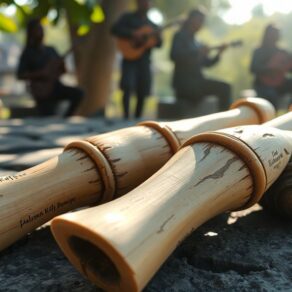The flute's role in ceremonies and rituals spans centuries and cultures, acting as a bridge between the earthly and the divine. You'll find it integral to rites of passage, from weddings to memorials, where its melodies evoke deep emotions and foster community connections. The flute's design reflects cultural identities, with each style echoing local customs and beliefs. Historically, it's also served healing purposes, promoting wellness and tranquility. Today, it continues to shape modern spiritual practices, merging ancient traditions with contemporary expressions. To fully appreciate its evolution and significance, there's much more to explore about this enchanting instrument's journey through time.
Key Takeaways
- Flutes have historically been essential in ceremonies, serving as instruments that connect earthly experiences with the divine.
- Used in rites of passage, flutes evoke emotions and enhance communal ties during significant life events.
- Melodies produced by flutes facilitate meditative states, guiding participants through rituals and fostering a sense of belonging.
- Flutes symbolize cultural identity and tradition, with unique styles reflecting local customs and beliefs across different societies.
- The craftsmanship of flutes preserves generational knowledge, enriching the cultural significance and sound quality in ceremonial contexts.
Ancient Flute Usage

Throughout ancient civilizations, the flute served not just as a musical instrument but as an essential component in ceremonies and rituals, connecting communities to their spiritual beliefs. You might find it fascinating that ancient flute techniques varied considerably across cultures, each shaping how the flute was played and perceived. In many societies, these techniques were passed down through generations, often becoming intertwined with the community's identity.
Prehistoric flute materials, such as bone, wood, and even clay, reflect the resourcefulness of early humans. Imagine the process of crafting a flute from a hollowed-out branch or a bone, each choice echoing the environment's influences. These materials weren't merely utilitarian; they held cultural significance, symbolizing the relationship between the community and nature.
When you consider how flutes were integrated into daily life, it's clear they weren't just for entertainment. They played a role in storytelling and preserving history, as well as facilitating communication with the divine. The melodies produced resonated with the rhythms of the earth, enhancing communal bonds during gatherings. Additionally, the use of extended techniques in modern flute compositions showcases how this instrument can evolve while still honoring its historical roots.
In essence, the flute became a vessel for expressing collective emotions and beliefs. Whether it was during harvest celebrations or rites of passage, the flute's presence enriched the experience, inviting everyone to participate.
Understanding ancient flute usage allows you to appreciate not only the instrument itself but also the profound connections it fostered within these communities.
Flutes in Religious Ceremonies

Flutes play a pivotal role in many religious ceremonies, serving as instruments that bridge the earthly and the divine. Their enchanting sound creates an atmosphere conducive to reflection, worship, and connection with the spiritual dimension. Whether in ancient rituals or modern practices, flutes have been integral to conveying spiritual melodies that resonate with the human soul.
- Flute worship is found in various cultures, often symbolizing a call to the divine.
- The melodies produced can evoke emotions, guiding participants into a meditative state.
- Flutes are used in rites of passage, marking significant life events with their ethereal tones.
- Many traditions incorporate flutes to honor deities, fostering a sense of community and belonging.
In many faiths, the act of playing the flute transcends mere performance; it becomes an offering, a way to express devotion and seek divine blessings. This connection between the musician and the spiritual world illustrates how music can serve as a universal language. The flute's role in various cultural contexts, including traditional folk music, showcases its ability to evoke nostalgia and connection to the past.
The ritualistic use of flutes reinforces communal ties, inviting participants to join in the sacred experience. As you listen to the soft, flowing notes, you may find yourself swept away into a dimension of tranquility, reflecting on the deeper meanings of existence.
The flute's role in religious ceremonies isn't just about sound; it's about creating a shared space where individuals can unite in their spirituality, fostering a deep sense of belonging and connection to something greater.
Cultural Significance of Flutes
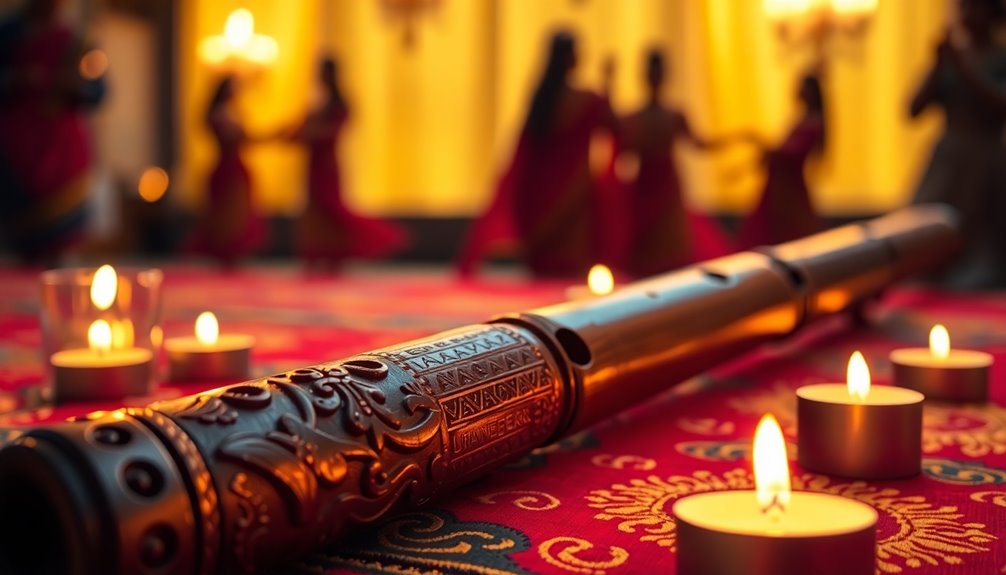
Many cultures around the world recognize the flute not just as a musical instrument, but as a symbol of identity and tradition. When you explore flute craftsmanship, you discover how deeply embedded this instrument is in the cultural fabric of various societies. Each region boasts unique styles, materials, and techniques that reflect local customs and beliefs. For instance, the intricate designs of Native American flutes often incorporate natural elements, symbolizing a connection to nature and spirituality.
Flute traditions serve as a means of storytelling and community bonding. In many cultures, flutes are played during festivals, marking significant life events such as births, weddings, or harvests. As you listen, you can feel the history and emotions woven into each note, creating a sense of belonging among listeners. The shared experience of music fosters connections, transcending language barriers and uniting people in a celebration of culture.
Additionally, the craftsmanship behind these flutes often involves generations of knowledge passed down through families. This commitment to preserving tradition empowers artisans and elevates the flute from mere instrument to a vessel of cultural heritage. By engaging with these traditions, you not only appreciate the beauty of the flute but also participate in a larger narrative that honors the past while shaping the future. Moreover, the use of high-quality woods in flute production enhances both the sound quality and the cultural significance of the instrument.
In understanding the cultural significance of flutes, you tap into a rich legacy that invites everyone to share in its melodious embrace, celebrating both individuality and community.
Flutes in Healing Rituals
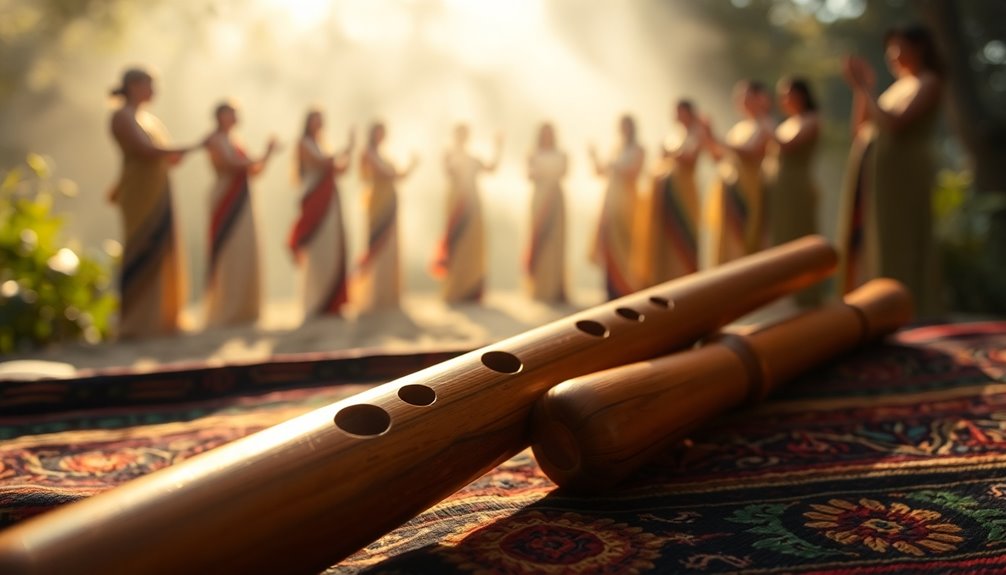
Using flutes in healing rituals reveals a profound connection between music and wellness across various cultures. The ethereal sounds of the flute have long been associated with spiritual resonance, facilitating deep emotional and physical healing. When you listen to the soothing melodies, you tap into a world where sound becomes a medium for transformation.
- Flutes are often used to invoke healing frequencies that promote relaxation.
- Many cultures believe that the vibrations of flute music can realign energy within the body.
- The act of playing or listening to flutes can enhance meditation practices, grounding individuals in the present moment.
- Communities often gather to share the experience, fostering bonds through collective healing.
Throughout history, flutes have played a central role in rituals aimed at restoring health. Indigenous tribes would use flute music to communicate with the spirit world, seeking guidance and healing for the sick.
In Eastern traditions, the flute's gentle tones are believed to clear blockages in the body's energy flow, encouraging holistic wellness. Additionally, the practice of breath control exercises further enhances the healing experience by promoting relaxation and focus during musical rituals.
Modern Ceremonial Practices
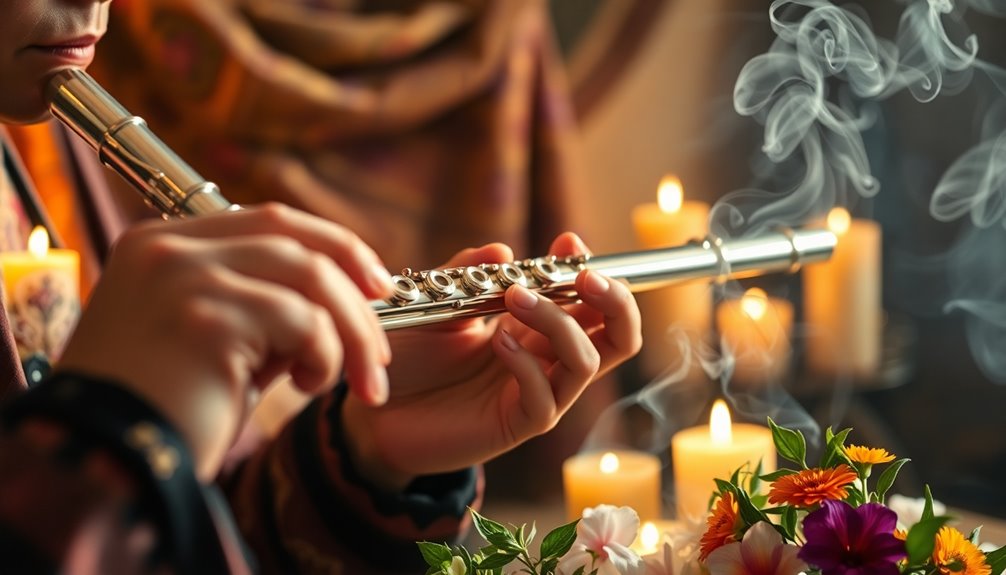
In contemporary ceremonial practices, the flute serves as an essential instrument that bridges ancient traditions with modern spirituality. You'll find it integral to various rituals, reflecting a deep connection to cultural heritage while adapting to current societal values. Flutes are often featured prominently in contemporary performances, where their ethereal sounds evoke emotions and foster a sense of community among participants.
At flute festivals, diverse musicians come together to showcase their artistry, transforming these gatherings into vibrant celebrations of music and culture. You'll experience a blend of traditional and innovative styles, allowing for the exploration of different cultural narratives. These events create spaces for belonging, where individuals from various backgrounds unite in appreciation of the flute's enchanting tones.
Modern ceremonial practices often incorporate the flute into rites of passage, such as weddings or memorials. The instrument's ability to convey both joy and sorrow allows it to resonate with the emotional undercurrents of these significant moments. As you engage with these ceremonies, the flute's melodies become a conduit for shared experiences, fostering deeper connections among participants.
Furthermore, the use of the flute in mindfulness and meditation practices reflects a growing trend towards holistic well-being. By integrating this ancient instrument into contemporary settings, you're invited to connect with both the past and present. Additionally, participating in flute ensembles provides musicians with a supportive environment for enhancing their skills and fostering a sense of community.
The flute, in these modern contexts, not only honors tradition but also enriches your spiritual journey, making it an indispensable part of today's ceremonial landscape.
Symbolism of the Flute
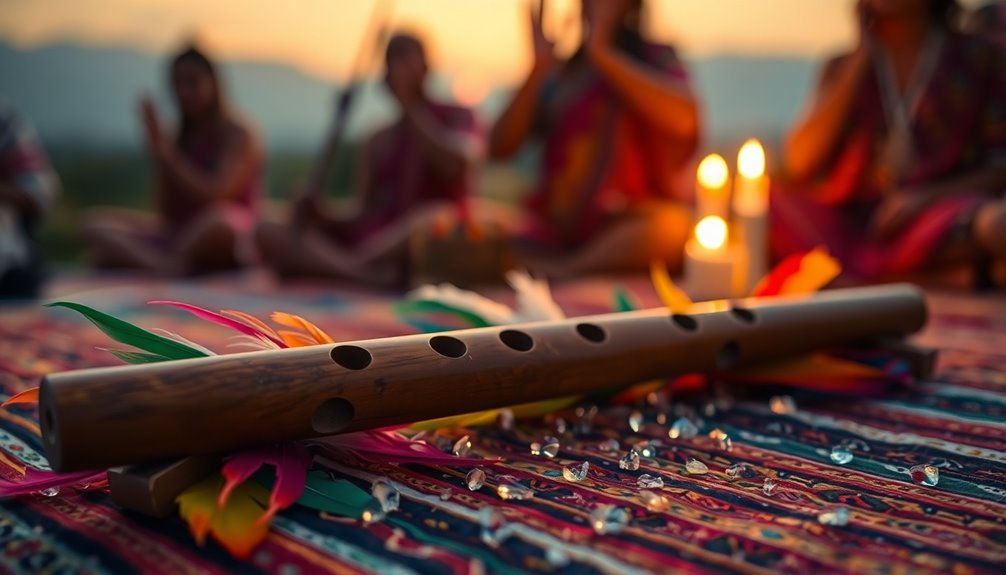
The flute's presence in ceremonies and rituals extends beyond its melodic capabilities; it embodies a rich tapestry of symbolism across cultures. The very act of playing the flute invokes a sense of connection, transcending time and space.
Here are a few key aspects of flute symbolism that resonate deeply:
- Voice of Nature: Often, the flute's sound mimics the calls of birds and the whispers of the wind, linking it to the natural world.
- Spiritual Connection: Many traditions view the flute as a conduit for spiritual communication, bridging the gap between the earthly and the divine.
- Emotional Expression: The flute's ability to convey a wide range of emotions makes it a powerful tool for storytelling in rituals.
- Unity and Harmony: In group settings, the flute fosters a sense of belonging, creating harmonies that symbolize collective spirit.
Flute symbolism carries profound spiritual significance, often associated with healing and transformation. In various cultures, its notes are believed to cleanse spaces and invite positive energies, enhancing the overall atmosphere of the ceremony.
You might find that when a flute is played, it creates a sacred environment where participants can feel more connected to one another and to the universe. Additionally, the incorporation of extended techniques in contemporary compositions showcases how the flute can evolve and adapt in modern spiritual contexts.
Ultimately, as you explore the multifaceted role of the flute in rituals, you'll discover how its melody resonates not just within the air, but within the very essence of human experience, fostering a sense of community and shared spirituality.
Frequently Asked Questions
What Materials Were Traditionally Used to Make Ancient Flutes?
When exploring ancient flutes, you'll find that artisans relied on diverse ancient materials like wood, bone, and bamboo. Each material contributed to unique sound qualities and flute craftsmanship, reflecting the culture's artistic values.
For instance, wooden flutes often symbolized nature's harmony, while bone flutes connected to ancestral spirits. By understanding these choices, you connect with the rich traditions that shaped music and community, embracing the timeless bond between sound and culture.
How Did Flute Styles Differ Across Various Cultures?
Picture a vibrant marketplace, filled with the sounds of flutes from various corners of the world.
You'll notice that flute styles differ dramatically across cultures, reflecting traditional techniques and cultural significance.
In Asia, bamboo flutes resonate with nature's whispers, while in the Andes, pan flutes echo ancient stories.
Each style carries its own history and emotions, inviting you to explore the rich tapestry of human expression woven through these beautiful instruments.
Are There Specific Flutes for Different Ceremonies?
Yes, there are specific ceremonial flutes designed for different ceremonies.
Each culture tends to use unique flutes that resonate with their ritual music, enhancing the spiritual experience.
For instance, Native American flutes often accompany healing ceremonies, while bamboo flutes may be used in Asian rituals.
You'll find that these ceremonial flutes not only produce distinct sounds but also carry profound cultural significance, making them integral to the rituals they accompany.
What Historical Figures Are Known for Playing the Flute?
You might be curious about the famous flutists who've left their mark on music history.
Legends like Jean-Pierre Rampal and James Galway haven't only mastered the flute but also inspired generations. Their artistry transcends mere performance, creating connections across cultures.
In addition, figures like Wolfgang Amadeus Mozart composed flute concertos that remain integral to the repertoire.
These flute legends remind us of the instrument's rich legacy and its ability to evoke deep emotional responses.
How Has Flute Construction Evolved Over Time?
Flutes have flourished through fascinating phases of evolution.
You'll notice modern innovations enhancing flute taxonomy, as materials shifted from wood to metals, making instruments more versatile. These changes not only improved sound quality but also expanded playing techniques.
As you explore this evolution, you'll appreciate how cultural contexts shaped the flute's design, creating a sense of belonging among musicians, each contributing uniquely to this timeless tradition.
Embrace the journey of the flute's transformation!
Conclusion
In exploring the flute's role across history, it's clear that this instrument isn't just wood and holes; it's a vessel of culture and spirit. From ancient rites to modern gatherings, the flute weaves together threads of healing, celebration, and community. Its haunting melodies resonate with our deepest emotions, reminding us of our shared humanity. As you reflect on its significance, consider how the flute continues to echo through time, inviting us to partake in a timeless ritual of connection.




